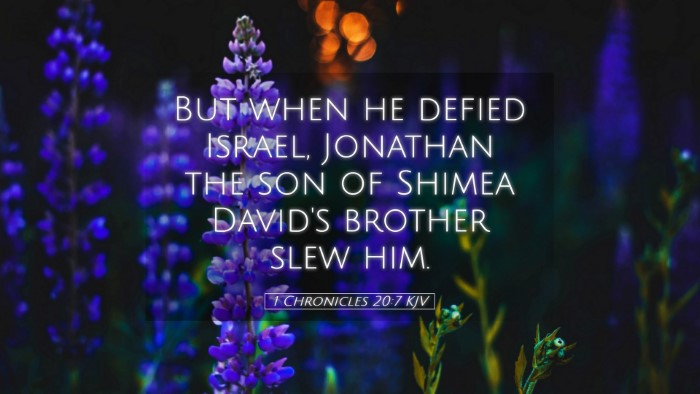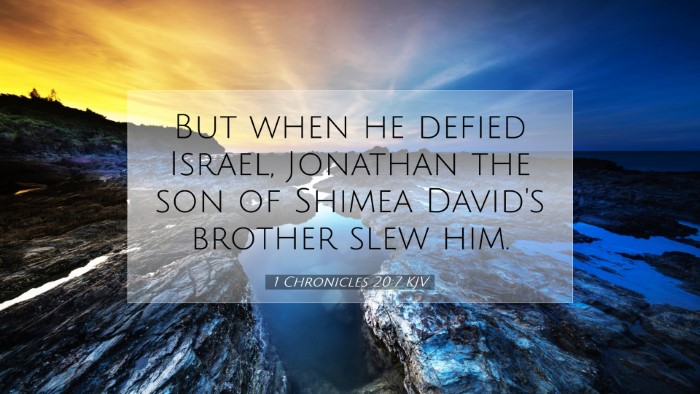Commentary on 1 Chronicles 20:7
Verse: "But when he defied Israel, Jonathan the son of Shimeah, David's brother, slew him."
Contextual Overview
The book of 1 Chronicles is often viewed as a historical document that focuses on the reign of David and the establishment of the Israelite kingdom. The passage in 1 Chronicles 20:7 occurs during a narrative about battles fought against the Philistines, highlighting themes such as leadership, bravery, and the sovereignty of God over Israel's enemies.
Insights from Public Domain Commentaries
Matthew Henry's Commentary
Matthew Henry emphasizes the significance of divine providence in this narrative. He notes the valor exemplified by Jonathan, who is often overshadowed by his more famous counterpart, David. Henry remarks that Jonathan's actions are a testament to the fierce loyalty and bravery found among David's circle. His courageous act of slaying the Philistine giant demonstrates the continuity of David's spirit and mission against Israel's adversaries. Furthermore, Henry suggests that Jonathan's lineage and dedication to God's people underline the importance of faithfulness in times of distress.
Albert Barnes' Notes on the Bible
Albert Barnes provides a detailed analysis of the Philistine context. He points out that Goliath's lineage is a critical aspect of this verse, which speaks to the ongoing conflicts between Israel and the Philistines. Barnes draws parallels between this encounter and the familiar story of David and Goliath, indicating that despite Goliath's lineage suggesting an inevitable victory for the enemy, it is through faith and courage that Jonathan defeats this foe. He also notes that the actions of Jonathan reflect a vital theme in Chronicles: God empowers individuals to achieve victories for His people, which underscores the idea that victory often comes through unexpected means.
Adam Clarke's Commentary
Adam Clarke offers a thorough exegesis of this verse, discussing the identity of Goliath as mentioned in the earlier text. He highlights the role of family lineage in the recurring conflicts with the Philistines, indicating that the giants were a persistent threat to Israel's stability. Clarke presents Jonathan's actions as more than mere bravery; they are tied to a theological perspective on God’s providential care. Jonathan, a member of David's family, acts in accordance with divine purpose by confronting the enemies of Israel. Clarke also expounds upon the use of 'defied' which conveys not only an act of physical aggression but also a spiritual challenge, asserting that defying God's people ultimately invites divine retribution.
Theological Implications
This verse encapsulates several key theological themes:
- The Sovereignty of God: Despite outward appearances, the conflicts faced by Israel showcase God's overarching authority and protection over His chosen people.
- The Role of Courage: Jonathan’s actions serve as an example of bravery that stems from faith. His willingness to confront enormous odds illustrates the calling of believers to trust in God even in the face of danger.
- God’s Providence: The text portrays how God uses seemingly ordinary individuals to achieve extraordinary feats, reminding the faithful that divine strength can be manifested through humble instruments.
- Familial Legacy: The connection to David’s lineage emphasizes the importance of faithfulness in one's family. This thread invites reflection on our own familial legacies and the role they play in our spiritual journeys.
Application for Today
For pastors, students, theologians, and scholars today, 1 Chronicles 20:7 offers a poignant reminder of how God works through individuals who are willing to stand firm against opposition. The character traits of bravery, loyalty, and commitment to God's people are essential in the service of the Church. This verse invites modern believers to consider how they can embody these qualities in their own lives, reflecting on their personal battles and the importance of supporting one another in faith.
Furthermore, this narrative encourages a higher view of conflict, not merely as personal struggles but as spiritual battles, calling for a reliance on God’s strength. In a contemporary context, the engagement against societal giants—be they moral, ethical, or spiritual—requires unwavering faith and courage akin to that displayed by Jonathan.
Conclusion
In summary, 1 Chronicles 20:7 serves both as a historical account and a theological resource that continues to resonate with believers. Through the lens of public domain commentaries, we glean insights into the character of God, the nature of courage, and the importance of standing firm in faith. Each commentary enriches our understanding, prompting us to reflect on our roles in God's redemptive story, echoing the timeless truth that with God, all things are possible.


